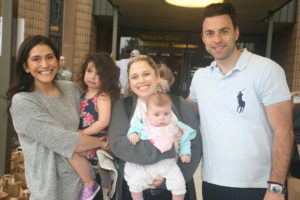
Millennials like to donate their money and time to charitable causes, according to local nonprofit leaders.
But — unlike older generations — they don’t just want to donate. They want to know why.
As we enter a new giving season, the Generation Z cohort continues to grow into adulthood. And, like their older siblings, Gen Z kids want to know why.
“A lot of them want to know the impact of their money,” said Polly Edelstein, the program manager of Tribe 12, which connects young Jews to Jewish life. “They want to see it.”
As Edelstein explained, older generations would just donate to a reputable organization. It was reliable, so they’d trust it to put their money toward worthwhile causes.
Millennials want to be in the rooms where allocation decisions are made.
“They want to be the ones who say this money should be allocated to x, y, z,” Edelstein said.
Tribe 12 focuses on Jews in their 20s and 30s. It connects them to Jewish life today so they stay connected tomorrow.
Founded in 2010, the nonprofit had to understand the young generation to survive, so it catered its fellowship program to the millennial mindset. Each year, the program includes 12 fellows who pay dues of $360 each. Half of each fellow’s dues go to a cause that the group selects together.
All 12 young people are welcome to pitch potential businesses and nonprofits as worthy recipients. The process includes talking to people from the outside organization and then presenting to the fellowship group.
“We work together in a consensus model,” Edelstein said.
One year, the fellows helped The People’s Paper Co-Op in North Philadelphia, which shares the stories of formerly incarcerated women trying to gain re-entry into society. In recent years, they have also helped an organization that organizes visits to children’s hospitals and one that offers legal services to survivors of domestic abuse.
These causes are not just worthwhile, but specific — another quality that’s important to younger adults, Edelstein said.
Millennials graduated into an economy pockmarked by the Great Recession of the late 2000s. Many have dealt with economic precarity or know people who have, or both.
Therefore, they are used to dealing with specific problems like expensive medical procedures or unpaid rent.
“If we donate to something that’s not hardship or something we can see, it gives people pause,” Edelstein said.
The millennial mindset translates to volunteering, too. Some nonprofit leaders have found that Jews of this generation enjoy donating their time.
Malkie Schwartz is the founder of Bikkur Cholim of Philadelphia, which helps kids who are hospitalized or homebound. Bikkur Cholim offers fresh food, toys and “anything to make it easier,” Schwartz said.
In November, a group of high school girls made salads and lasagna to deliver. A school approaching the organization with an offer to help is common, according to the founder.
So is a Bat Mitzvah girl asking to do her service project with Bikkur Cholim. The most recent one consisted of the girl wrapping sashes of soap and shampoo with bows on top.
Since COVID broke out in March 2020, older volunteers have been more hesitant about going to hospitals. So now, the organization has younger people visiting local hospitals to stock its food pantries.
“When you help somebody else, you feel good about it,” Schwartz said.
Samuel Domsky is the chair of Project H.O.P.E. in the Dresher area. Every Passover, the charitable organization provides meals to the needy and elderly.
While Domsky doesn’t get much money from millennials, he does get their time. Each spring, young Jews come to Temple Sinai in Dresher to bag food and then drive it out to people.
By participating, millennials see what their efforts are doing. They grow to understand that they are helping people in their community.
“It gives them a sense that they really have contributed to something that’s meaningful,” Domsky said.
Participation also makes millennials more likely to donate at least a little bit of money. Domsky gets 200-plus donations a year. Many are small, like $10 or $25, and, therefore, doable for younger residents.
“We want people to volunteer, get involved in the program and then take ownership of it,” he said.

Galvanizing millennials into deep involvement is difficult for organizations. But, as Domsky explained, it’s not impossible.
For a generation skeptical of institutions, commitment must be earned.
This is perhaps easier for narrowly focused initiatives like the Tribe 12 fellowship program, Bikkur Cholim and Project H.O.P.E. But for a wide-ranging nonprofit like the Jewish Federation of Greater Philadelphia, it’s a little harder.
“Our parents’ generation gave to the (Jewish) Federation because it’s what you do,” said Adam Klazmer, the board chair of NextGen, the Jewish Federation’s under 40 group. “Our generation has needed more of a purpose.”
To handle this challenge, NextGen tries to recruit local Jews into its leadership development program. The program requires little more than a commitment to learn about what the Jewish Federation does.
“Here’s what we do to support Israel, Holocaust survivors, Jewish education,” Klazmer said. “Here’s what we do to make sure Jewish kids get Chanukah presents.”
By explaining those efforts, the program helps millennials learn which Jewish Federation cause might mean the most to them. Then, once they get involved, they stay involved and are more likely to trust the organization.
Klazmer and several other NextGen board members got involved through the development program.
“That seems to be the most successful way for people to get involved,” Klazmer said.
[email protected]; 215-832-0740






